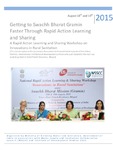| dc.contributor.author | Ministry of Drinking Water and Sanitation, Government of India | |
| dc.contributor.author | Water Supply and Sanitation Collaborative Council (WSSCC) | |
| dc.contributor.author | Institute of Development Studies (IDS) | |
| dc.coverage.spatial | India | en |
| dc.date.accessioned | 2020-08-04T10:19:22Z | |
| dc.date.available | 2020-08-04T10:19:22Z | |
| dc.date.issued | 2015-08-19 | |
| dc.identifier.citation | Ministry of Drinking Water and Sanitation, WSSCC & IDS (2015) Getting to Swachh Bharat Gramin Faster Through Rapid Action Learning and Sharing: A Rapid Action Learning and Sharing Workshop on Innovations in Rural Sanitation', Community-Led Total Saniation, Brighton: Institute of Development Studies | en |
| dc.identifier.uri | https://opendocs.ids.ac.uk/opendocs/handle/20.500.12413/15565 | |
| dc.description.abstract | The two-day National Workshop on Rapid Action Learning and Sharing of Innovations in Rural Sanitation highlighted various best practices and innovations that are helping achieve the outcomes envisaged under Swachh Bharat Mission Gramin. It brought together practitioners and champions at various levels, from Gram Panchayat to District Level and also policy makers from Government of India and State Governments as well as Development Partners. It served as an important first step towards institutionalizing the practice of documenting, learning and sharing of what has worked and also enabled a need to understand what has not worked.
The role of the community, the role of champions at all levels, the need for sustainable and collective behavior change, the role of the district administration as an enabler rather than a provider, and the need to understand the aspirations and drivers of household level behavior change (such as dignity and pride which were central to the success in Rajasthan) were the major points to be understood through the discussions. The political will and enabling environment has been set, but what needs a closer look is the creative use of the incentive, such as a reward for the community after it becomes ODF.
The States identified their needs for similar workshops at the local level for faster dissemination of information and to enable faster action. Capacity and Human Resources Development for supporting and managing rapid action learning processes as well as to meet the momentum for getting results faster was seen as a crucial requirement. Several States such as Chhattisgarh, West Bengal and Madhya Pradesh are keen to take on a State Level Rapid Action Learning Unit (RALU). Development Partners were explicit in the need to capture data, leading to information and knowledge and their role in disseminating widely. The next steps are to dedicate full-time resources for learning and sharing at Central and State Level. | en |
| dc.description.sponsorship | Funded by the Swedish International Development Cooperation (Sida). | en |
| dc.language.iso | en | en |
| dc.publisher | Institute of Development Studies | en |
| dc.rights.uri | http://creativecommons.org/licenses/by-nc-nd/3.0/ | en |
| dc.subject | Environment | en |
| dc.subject | Participation | en |
| dc.title | Getting to Swachh Bharat Gramin Faster Through Rapid Action Learning and Sharing: A Rapid Action Learning and Sharing Workshop on Innovations in Rural Sanitation | en |
| dc.title.alternative | A Full Report on Rapid Action Learning & Sharing Workshop | en |
| dc.type | Conference paper | en |
| dc.rights.holder | Institute of Development Studies | en |
| dc.identifier.externaluri | https://sanitationlearninghub.org/?post_type=resource&p=1889&preview=true | en |
| dc.identifier.team | Participation | en |
| dcterms.dateAccepted | 2015-08 | |
| rioxxterms.funder | Default funder | en |
| rioxxterms.identifier.project | The Sanitation Learning Hub | en |
| rioxxterms.version | NA | en |
| rioxxterms.funder.project | 5e50f69d-6102-4a66-b12d-49ceb02612b0 | en |


